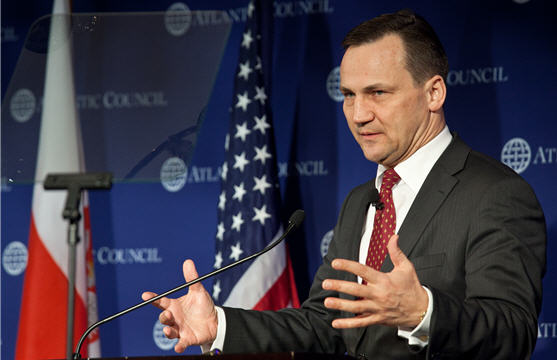 Polish Foreign Minister Radosław Sikorski believes that there are many parallels between the freedom movements spreading across North Africa today and the fall of Communism in Eastern Europe. And he calls on the West should do everything in its power to help those people to achieve the success of his.
Polish Foreign Minister Radosław Sikorski believes that there are many parallels between the freedom movements spreading across North Africa today and the fall of Communism in Eastern Europe. And he calls on the West should do everything in its power to help those people to achieve the success of his.
He began his formal remarks with an revelation that many of us over a certain age have had: “One day you realize that for your children the life you’ve had is part of history. It’s old.”
Sikorski was on the precipice of adulthood when history of the epic variety began to unfold: “Solidarity, the Gdansk shipyards, martial law, the grace and leadership of Pope John Paul II, the Round Table, the first free elections, President Lech Walesa.” But, fresh as those memories may seem, those dominoes began to fall three decades ago. So, “a Polish student, born in a free society in December 1991, today finds it hard to grasp what it was all about: especially General Jaruzelski’s scary spectacles.”
But, while the “Polish example recedes into history,” we see “new examples are here before our very eyes. Belarus. Egypt. Bahrain. Libya. Countries where people at last have hope. And demand immediate change.”
Immense courage is required to demand freedom from dictatorship: “People must look at themselves: Do I keep my head down, engage in petty sabotage here and there, hope for better times? Or do I raise my head? Do I risk all to be free?”
And, like his fellow Bronislaw Geremek lecturer, Senator John McCain, Sikorksi demands of his fellow citizens deeds, not words, at such a moment.
“People facing this fateful choice need to know that they’re not alone—that they have friends.” And Poland did. “The United States government and people gave Poland strong political words. They backed those words with strong action. Radio Free Europe. Help to NGOs and trade unionists and journalists. Scholarships and training. Help for families of activists in prison. Help to our Catholic Church. We democrats knew whose side you were on. Ours!”
Sikorski noted that the situation is, in some ways, more difficult today. Unlike the brave Poles of Solidarity, those struggling for freedom across the Middle East and North Africa today “don’t look to Gary Cooper for inspiration. They know what they don’t want. They have yet to discover what they do want.”
Moreover, “We can’t be sure that they will want what we want.”
Still, he is “urgently working with my EU colleagues to work out how best to help. We are looking at a European Endowment for Democracy, to help democratic forces in countries and regions neighboring the European Union, East and South.”
But, amidst all the heady talk about the glory days of 1989, he cautioned: “Let’s also be smart. Let’s tie EU support to democratic performance in partner countries.”
This is because, comparatively, “Free elections are the easy bit.” This is followed by what he termed “the slow slog.”
“Building democratic institutions and democratic practices—above all self-discipline—to make democracy work. There are no short-cuts.”
We should set an example by our own actions. Further, the EU should provide access to its markets—without the years of deliberation and delay that is its hallmark. Additionally, scholarships, visas, and other tools should be used to allow the young people from these aspiring democracies to see modernity up close.
Ultimately, while the West can not “impose an outcome,” Sikorski implored, “What we can and must do is offer a principled, generous helping hand.”
James Joyner is managing editor of the Atlantic Council.
